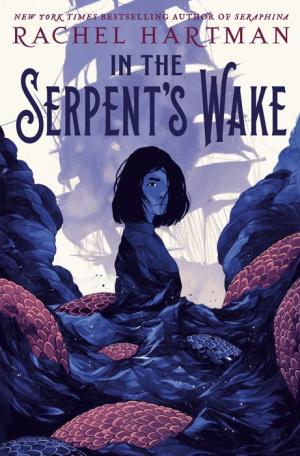One of the traps I fall into most easily as a writer is the illusion that I know what I’m doing. I have a few novels under my belt, and have seen some success with them. Readers have occasionally marvelled at my artistry, or even proclaimed me wise. I, for one, am all too ready to believe the hype about myself.
That is, until I start writing a book that is too hard for me. Which is every book I write, somehow. I end up with two choices—abandon the hard book and write something easier, or abandon the notion that I have any idea what I’m doing.
I highly recommend the latter. It’s humbling, but frees me to look around and find help in unexpected places.
I was in just such a position in 2019. I had written two or possibly three drafts of In the Serpent’s Wake—the exact number eludes me, it was a whole pandemic ago—and I was feeling stuck and thoroughly incompetent. The book wasn’t working, and I had not yet figured out why. Because this was the sequel to Tess of the Road, I was working in close third person from Tess’s point of view, just like the original. This was earning me devastating comments from my editor along the lines of, “Tess knows better than this. She seems to be regressing,” and “The reader has already figured out [X]. Why hasn’t Tess?”
Ouch.
Well, by serendipitous chance I was invited to do a book event with Jay Kristoff, on tour for his latest joint project with Amie Kaufman, Aurora Rising (Amie couldn’t make that tour, alas). I knew Jay from way back when Goodreads was a fun place for authors to hang out, not the ego graveyard it’s become, so I was glad for an evening where I could laugh and forget my writing woes. What I couldn’t have predicted was that Aurora Rising, a fast-paced space-operatic YA squad adventure—different from my own dense fantasy in everything but the YA—was going to give me the answer I needed to move forward.
If you haven’t read Aurora Rising, it’s the story of a squad of misfit space Legionnaires learning to work together to help a friend with mysterious powers learn the secrets of her past. Wisecracks abound. There are space chases, sinister government cover-ups, ancient alien cultures, more fish than one would have guessed, the Great Ultrasaur of Abraaxas IV, nightmarish horror plants—all kinds of fun stuff. The interjections by Magellan, the futuristic smartphone (more like a smart-ass phone), brought to mind the Encyclopedia Galactica in The Hitchhiker’s Guide to the Galaxy. That’s the vibe. Teen me would have been obnoxiously quoting all the jokes forever.
Right in the middle of everything the squad pulls off a heist, because of course they do, and it’s a good heist. I say this as someone who generally finds heists boring. A tedious heist only fools the people who get robbed; a good heist fools me. I read it, and then I went back and read it again—as if Amie and Jay had inserted a secret message in their book just for me. Never mind how the squad pulled it off, I wanted to understand how the authors had pulled it off.
The book is written from multiple viewpoints, all six squad members plus their mysterious friend, and what I saw as I re-read the heist was that the authors had used the shifting perspectives to deftly direct and misdirect what the reader knew (or thought she knew). They would cut off scenes in such a way that the reader made an assumption about how the scene ended—a crucially incorrect assumption, in one particular scene. The reader would then go forward with “knowledge” that colored their interpretation of what followed, preventing them from noticing other things that might have given the game away.
These authors had pulled off an epistemological sleight-of-hand, enabled by the multiple PoVs.
I’m sure I asked Jay Kristoff questions about writing multiple viewpoints at that book event, but I hadn’t read the book yet, so they were probably pretty general. And, to be fair, it’s been a hundred years since 2019, so I don’t remember that conversation in much detail. I had a chance to ask Amie Kaufman a few questions for this article, however, which she graciously answered. She is a “giant craft nerd”—her own words, which I respect immensely—and has done a lot of thinking and even podcasting on the subject of multiple PoVs. This episode on voice is a useful place to start if you’re thinking of attempting multiple PoVs in your own work. “Strong, distinctive voices for your characters will do so much heavy lifting, not just in terms of keeping the reader in the loop, but in terms of building a sense of world and personality,” she told me. She and Kristoff juggle seven voices in all for Aurora Rising, and do an impressive job of it.
But insight into different people’s personalities and events was, to me, the obvious reason to write multiple viewpoints. What PoV as a means of regulating knowledge? How did that figure into deciding which part of the narrative would belong to which character?
“There are a pile of considerations when it comes to choosing who’ll be the narrator for any given chapter,” Kaufman affirmed, and then proceeded to ask a bunch of questions of her own. “Who’s being most deeply impacted by what’s happening? Do we want to see how they’re taking it, or do we want the reader to wonder about their reaction? Who has knowledge they could offer, or withhold? Who’s familiar with the new setting we’re heading into, or isn’t, and can ask helpful questions? Who has a secret that we’re prepared to let the reader see, but not the other characters? Who’s about to suffer the most pain, or make the most wrenching decision in this chapter?”
This gets to the meat of what Aurora Rising had made me realise. Point of View could be a consciously-wielded tool for manipulating knowledge. In Kaufman’s words, “[multiple perspectives] give us the opportunity to share things with the reader that we might keep from the other characters.” It allows us to exploit the tension between what the characters know and what the reader knows—and use it for evil.
Aurora Rising helped me understand why I was stuck. My single-protagonist close 3rd person PoV had created a kind of epistemological choke point. Everything I needed the reader to know had to be filtered through Tess—she had to experience it, or hear about it from someone else, or deduce it herself. But the number of things I needed the reader to know, see, feel, or experience, was more than I could comfortably channel through a single character. I had put Tess through a variety of plot contortions to acquire knowledge that the reader needed but she did not, which felt awkward at best and contrived at worst. And sometimes it was making Tess look foolish.
For example: a character from Tess’s past returns in In the Serpent’s Wake. I don’t think that’s too much of a spoiler—a careful read of Tess of the Road should give you a hint as to who it might be, but I’ll call him Ted to be safe. His return is meant to be a surprise to Tess, but when the narrative was stuck exclusively in Tess’s head, her ignorance (or possibly denial) became first implausible and then irritating. If the reader can tell he’s coming back, why can’t she? And yet every time Ted was mentioned (because the reader needed a few facts before he reappeared), she had to pretend she hadn’t heard. When I began adding points of view, I was able to put that Ted-specific information in someone else’s thoughts, where Tess couldn’t hear it. Tess’s ignorance could now be suspenseful rather than irritating, as we fret over the inevitable train wreck of her learning the truth.
Now I must confess, the way I went about converting my single-PoV manuscript into a multiple-PoV novel was…not something I would wish upon my worst enemy. If you think your story could use multiple PoVs, I would highly recommend beginning with that intention, and planning at least a bit. As Kaufman told me, “We knew from early on that we were writing about a squad, and we wanted every member of the group to have their own arc and their own voice”—and at least one of those arcs starts very slowly in this first book and grows and blossoms over the course of the trilogy. As an incorrigible pantser, I stand in awe of that degree of planning.
I, alas, already had 140K-word draft written from a single perspective. I didn’t start over from scratch; I converted it one chapter at a time. I looked for chapters where Tess seemed to be extraneous to her own story, a fly on the wall for someone else’s drama. Where someone was having to explain their backstory to her—or where I wished I could include their backstory in a natural way, without making the reader sit there and listen to them talk. In short, where there was information the reader needed to know, but Tess did not. And then I would think about which other character could be narrating this chapter instead. At first, I only did chapters with Spira and Marga, but soon I realized other people’s voices also needed to be heard—Jacomo, Hami, Kikiu. There’s a chapter from a Katakutia, who understands the languages of every sentient being, a poem by a Tiger Knight, and a voice from the dead. I was converting additional chapters to new perspectives right up until the very last draft.
So if you’ve written a draft with a singular perspective, and realize the book would be stronger with more points of view, all is not lost. It’s a Herculean effort, but well worth it if that’s what the book needs. More generally, though: be open, and be humble. Help is all around us, if we’re willing to let ourselves see it. And my thanks to Kaufman and Kristoff for Aurora Rising. You made me feel, and you made me think, and that’s what art is for.
Buy the Book


In the Serpent’s Wake
Rachel Hartman is the author of the acclaimed and New York Times bestselling YA fantasy novel Seraphina, which won the William C. Morris YA debut Award in 2013, and the New York Times bestselling sequel Shadow Scale and Tess of the Road. Rachel lives with her family in Vancouver, Canada. In her free time, she sings madrigals, walks her whippet in the rain, and is learning to fence.










